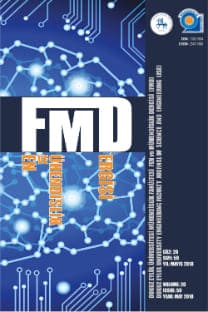TCE Kaynak Zonların Yerinde Kimyasal Yıkama ile Islahı: Tween 80 ve SDS ile Yıkama Performansı
In-Situ Remediation of TCE Source Zones by Chemical Flushing: Performance of Tween 80 and SDS
___
- [1] Feenstra, S., Cherry, J.A., 1988. Subsurface contamination by dense non-aqueous phase liquid (DNAPL) chemicals. International Groundwater Symposium, The International Association of Hydrogeologists, Halifax, Nova Scotia.
- [2] Mercer, J.W., Cohen, R.M., 1990. A review of immiscible fluids in the subsurface: Properties, models, characterization and remediation. J. Contam. Hydrol., 6: 107-163. DOI: 10.1016/0169- 7722(90)90043-G
- [3] Mckay D. J., Stark J. A., Young B. L., Govoni J. W., Berini C. W., Cronan T. J., Hewitt T. J. 2000. ‘‘A field demonstration of trichloroethylene oxidation using potassium permanganate’’. Proceedings of the Second International Conference on Remediation of Chlorinated and Recalcitrant Compounds, Monterey, CA, USA, 109-116.
- [4] Boving, T.B., Brusseau, M.L. 2000. Solubilization and removal of residual trichloroethene from porous media: Comparison of several solubilization agents. J. Contam. Hydrol, 42: 51-67. DOI: 10.1016/S0169-7722(99)00077-7
- [5] Tick, G.R., Lourenso, F., Wood, A.L., Brusseau, M.L., 2003. Pilot-scale demonstration of cyclodextrin as a solubility-enhancement agent for the remediation of a tetrachloroethene-contaminated aquifer. Environ. Sci. Technol., 37: 5829-5834. DOI: 10.1021 /es030417f
- [6] Tick, G., Rincon, E., 2009. Effect of enhanced solubilization agents on dissolution and mass flux from uniformly distributed immiscible liquid trichloroethylene (TCE) in homogeneous porous media. Water, Air and Soil Pollut., 204: 315-332.
- [7] Difilippo, E.L., Carroll, K.C., Brusseau, M.L. 2010. Impact of organic-liquid distribution and flow-field heterogeneity on reductions in mass flux. J. Contam. Hydrol. 115: 14–25. DOI: 10.1016/j.jconhyd.2010.03.002
- [8] Harvell J.R., 2012. Solubilization of Multi-component immiscible liquids in homogeneous systems: A Comparison of different flushing agents using a 2-D flow-cell. M. Sc. Thesis, University of Alabama, 83s.
- [9] Akyol, N.H., Russo A.L., Brusseau, M.L. 2013. Impact of EnhancedFlushing Reagents and Organic Liquid Distribution on Mass Removal and Mass Discharge Reduction. Water Air and Soil Pollut., 224:17-31.
- [10] Tick G. R., Harvell J.R., Murgulet D., 2015. ‘’Intermediate-Scale Investigation of EnhancedSolubilization Agents on the Dissolution and Removal of a Multicomponent Dense Nonaqueous Phase Liquid (DNAPL) Source’’, Water, Air and Soil Pollut., 204, 315-332.226-371.
- [11] Turkkan S., Akyol N.H., 2017. Cyclodextrin-Enhanced In-situ Flushing of TCE Source Zones Resided in Heterogeneous Porous Media, International Journal of Advances in Science, Engineering and Technology (IJASEAT)., 5, Iss-2, Spcl Iss-1 (P-I).
- [12] Russo, A.E., Mahal, M.K., Brusseau, M.L., 2009. Nonideal behavior during complete dissolution of organic immiscible liquid: 1. Natural porous media. J. Hazard Mater., 172: 208–213.
- [13] Mahal, M.K., Murao, A., Johnson, G.R., Russo, A., Brusseau, M.L. 2010. Non-ideal behavior during complete dissolution of organic immiscible liquid: 2. Ideal porous media. Water, Air, Soil Pollut., 213: 191-197.
- ISSN: 1302-9304
- Yayın Aralığı: 3
- Başlangıç: 1999
- Yayıncı: Dokuz Eylül Üniversitesi Mühendislik Fakültesi
TARİHİ ERZURUM YAKUTİYE MEDRESESİ’NİN YAPISAL DAVRANIŞININ İNCELENMESİ
İrfan KOCAMAN, İlker KAZAZ, Dilek OKUYUCU
A PROSPECT ON INTEGRATİON OF SOLAR TECHNOLOGY TO MODERN GREENHOUSES
Ahmet ERYAŞAR, Elif GÖDEKMERDAN, Sevim ÖZGÜL, Mert DÜZENLİ, Günnur KOÇAR
Yeşil Bilişim Yaklaşımlarıyla Kullanıcı ve Kurum Odaklı Enerji Yönetim Sistemi
GÖZENEKLİ ZRB2 PELETLERİN FARKLI SICAKLIKLARDAKİ OKSİDASYON DAVRANIŞLARI
Esra DOKUMACI, İlker ÖZKAN, A. Bülent ÖNAY
ATIK İÇECEK KUTULARINDAN ÜRETİLMİŞ ALÜMİNYUMUN MEKANİK ÖZELLİKLERİNE SOĞUK İŞLEMİN ETKİSİ
